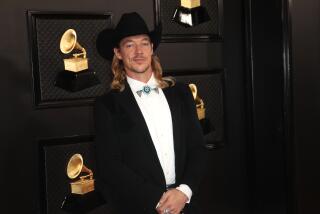Search Engine Images Attract Copyright Suit
Ditto.com is a search engine that allows computer users to find photographs and other images on the Web. Type in “Tiger Woods” and you’ll get a page containing thumbnail images of the golfing great copied from other sites on the Internet, along with links to those sites.
The question is: Are those copies stolen images?
They are according to some artists and photographers who are pursuing a lawsuit aimed squarely at one of the key features of the Internet: search engines’ practice of making copies of other people’s content and storing them in databases for easy retrieval by Web surfers.
In a recent decision, a U.S. District Court judge in Santa Ana said Ditto.com of Naperville, Ohio, did not violate copyright laws when it copied photographs from Web sites operated by Huntington Beach photographer Leslie A. Kelly, who sued the search engine. Ditto’s action, said Judge Gary L. Taylor, amounted to “fair use” of the photographs.
Trade groups representing Kelly and thousands of other artists have mounted an appeal of Taylor’s ruling, which is expected to become final this week.
Intellectual-law experts say the case has far-reaching implications for search engines and the Internet. Until the judge’s opinion, experts were unclear whether search engines such as Yahoo, AltaVista and Excite, among others, trampled the rights of copyright holders when they copied and indexed portions of their articles, illustrations and other protected works.
“The issue of copying on the Internet has been of great concern because, after all, the Internet is nothing more than a giant copying machine,” said John Shepard Wiley Jr., a UCLA law professor who also teaches intellectual property law to federal judges. “Because this is the first case that addresses the issue, it gives us the clearest picture of what the rules will be.”
If the judge had reached the opposite result, Wiley said, he could have outlawed a common practice by search engines that makes it easy for computer users to find information on the Internet.
Mark A. Lemley, a professor of law at UC Berkeley’s Boalt Hall School of Law and a director of the Berkeley Center for Law & Technology, agrees. “If you come to any different result, search engines would be illegal, and the Internet would come to a screeching halt,” he said. “If you don’t have search engines, you don’t have an Internet.”
But trade groups representing graphic artists and media photographers disagree, saying the ruling encourages digital theft and erodes copyright owners’ ability to market--and control--their artwork on the Internet.
“We hope this is not a step down the slippery slope and toward a wild, wild West approach to property on the Internet,” said Victor Perlman, president and general counsel of the American Society of Media Photographers, a 6,000-member group based in Philadelphia. “Because something is on the Internet doesn’t mean it’s free for the taking or that the laws of copyright have suddenly gone out the window.”
Kelly specializes in shooting photographs of California’s Gold Rush country and sites described in the “Little House on the Prairie” series of children’s books by Laura Ingalls Wilder. Kelly posts his pictures on two Web sites--https://www.showmethegold.com and https://www.goldrush1849.com--to promote his photography books and corporate retreats in the California gold country.
Last year, Kelly sued Ditto for copyright infringement after discovering that it had taken 35 pictures from his Web sites and stored them in its massive database of more than 3 million images.
To compile its database, Ditto’s automated computer program, known as a crawler or spider, scours the World Wide Web for images, makes postage-stamp size copies of them, then stores them in its database.
Other search engines operate in a similar manner. In fact, search engines AltaVista and Lycos, which allow computer users to search for images as well as text had also copied and stored Kelly’s images in their own database, but removed them after Kelly threatened to sue.
Kelly pursued a suit against only Ditto, saying he objected to the way it “mishandled” his artwork.
Computer users who searched for “California Gold Rush country” on Ditto would have seen several of Kelly’s thumbnails in their results. Clicking on a thumbnail brings up a larger version of the image imposed over the originating page from Kelly’s own Web site.
Kelly said Ditto’s action irked him. “It was taking my property and using it to enrich its own business without my permission and with no compensation for me,” he said.
Ditto, a 2-year-old operation venture-backed by European Technology & Finance of Lugano, Switzerland, hopes to make money by selling banner ads and products of other firms on its Web site.
Kelly received support--and a $10,000 check to help cover his legal fees--from the Graphic Artists Guild in New York, a 3,000-member group that says it has been increasingly concerned about artists losing their copyrights over the Internet.
Indeed, the suit against Ditto was not unexpected. In their quest to catalog the hundreds of millions of indexable pages on the Internet, search engines must often duplicate copyrighted works.
For years, intellectual-law experts questioned whether search engines violated copyright laws through this type of copying. Until Kelly’s suit, the issue had never come up mainly because many Web site operators acknowledge that search engines benefit them by driving traffic to their sites.
Defending Kelly’s suit, Ditto’s attorney, Judith B. Jennison of Perkins Coie in Menlo Park, Calif., argued that Ditto’s use of thumbnails of Kelly’s photographs may have increased the marketability of his photographs.
She also noted that Web surfers were not likely to make their own copies of Kelly’s pictures on the Ditto Web site because the thumbnails were of a low resolution, meaning they could not be enlarged without sacrificing clarity.
Requiring search engines to receive permission before they copy material would be too cumbersome, Jennison said, especially when people like Kelly could easily install software that blocks a crawler from visiting their Web sites. And if his and others’ sites were crawled against their wishes, Ditto would honor requests to remove their images within 24 hours.
In a ruling issued in December, Taylor said Ditto’s copying of Kelly’s image was “fair use . . . because of the established importance of search engines and the ‘transformative’ nature of using reduced versions of images to organize and provide access to them.”
Taylor found that Ditto was covered by that fair-use exception in the copyright laws, which states that portions of a copyrighted work may be distributed without permission of a copyright owner for purposes of criticism, news reporting and research.
Kelly has hired a top Washington lawyer to appeal Taylor’s ruling to the U.S. 9th Circuit Court of Appeals.
Several leading copyright law professors interviewed about the case said they believe the court will uphold Taylor’s ruling.
“It will come down to the public’s interest in having search engines,” said Lemley, the Berkeley law professor. “And that’s very strong.”






